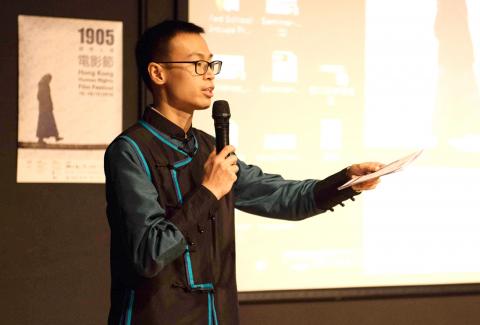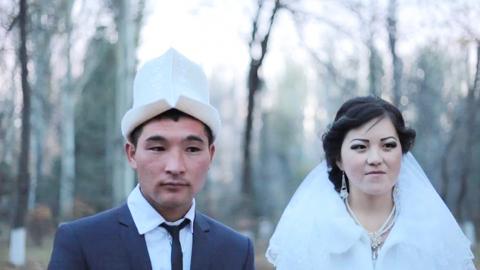Last month, the New York Times reported that Chinese activist Li Dan (李丹) had “relocated” his 1905 Hong Kong Human Rights Film Festival to Taiwan, with a smaller satellite festival in its original location.
Looking at the schedule, however, perhaps Li has changed his mind. The festival will indeed take place concurrently in both locations, but there are still significantly more offerings in Hong Kong than in Taiwan.
“It’s more like an expansion, because we can’t give up on Hong Kong,” Li says, noting that Taiwan’s freedom of speech allows for more opportunities for funding and exchanges. The festival will continue in Hong Kong, he says, to maintain his original purpose of exposing people there and China to human rights issues.

Photo courtesy of 1905 Human Rights Film Festival
In collaboration with the Formosa Festival of International Filmmakers (福爾摩沙國際電影節) and the Taiwan International Queer Film Festival (台灣國際酷兒影展), the renamed 1905 Human Rights Film Festival kicks off its Taiwan program on Saturday with 15 feature and documentary productions, shown mostly at smaller venues such as coffee shops, bookstores and universities.
ACTIVISM
Li has long been on the frontlines of Chinese activism, starting from his involvement in HIV prevention in 2003, for which he won the Reebok Human Rights Award in 2006 for non-violent activists under 30 years. In recent years, he’s turned his focus toward cultural activities, such as opening a bookstore in Hong Kong and establishing the China Women’s Film Festival.

Photo courtesy of 1905 Human
“You might think that you’ve made a significant difference as an activist fighting directly against the government. But when you count the number of people involved in human rights in China, both back then and today, there’s just a few thousand at most. For real change, we need strong civic participation. How do we get the public involved?” Li says.
Li says that although the festival pushes the envelope, it’s difficult to shut down a film festival. However, there’s no way that a human rights program would be allowed in China. And with Beijing tightening its control over Hong Kong, Li felt that opportunities for growth would be limited.
“It’s not to the point in Hong Kong where we can’t talk about anything, but it’s tough as far as seeking resources,” he says.

Photo courtesy of 1905 Human Rights Film Festival
SELF-CENSORSHIP
Li says he could seek funding from foreign embassies in China, but their Hong Kong counterparts have a much smaller budget for such activities. Hong Kong corporations that want to stay on China’s good side will avoid the festival due to its association with human rights, which greatly reduces the number of potential investors.
Even filmmakers are reluctant to participate or help out in fear of repercussions by the Chinese government, Li says.

Photo courtesy of 1905 Human Rights Film Festival
“People often think that we’re spies [coming from China],” he adds. “They think it’s strange that we’re able to put together such a film festival in Hong Kong without the government interfering. But we know how to find the cracks in the steel plate where we can operate.”
Li says the key is to keep a low profile, to remain outside of the “top 10.”
“Also, insist that you’re not doing anything new. When they question me, I just tell them, hey, Hong Kong already has the [Hong Kong Human Rights Documentary Film Festival],” he says.

Photo courtesy of 1905 Human Rights Film Festival
The main goal in establishing a presence in Taiwan, in addition to resources, is to establish a platform where filmmakers from the region and beyond can freely interact and exchange ideas.
“Taiwan already has a lot of film festivals, we don’t need to join in on the fun,” Li says. “We are looking for a long-term base where we can have workshops, collaborations, discussions, seminars, bring international filmmakers here and Taiwanese overseas.”

In Taiwan there are two economies: the shiny high tech export economy epitomized by Taiwan Semiconductor Manufacturing Co (TSMC, 台積電) and its outsized effect on global supply chains, and the domestic economy, driven by construction and powered by flows of gravel, sand and government contracts. The latter supports the former: we can have an economy without TSMC, but we can’t have one without construction. The labor shortage has heavily impacted public construction in Taiwan. For example, the first phase of the MRT Wanda Line in Taipei, originally slated for next year, has been pushed back to 2027. The government

July 22 to July 28 The Love River’s (愛河) four-decade run as the host of Kaohsiung’s annual dragon boat races came to an abrupt end in 1971 — the once pristine waterway had become too polluted. The 1970 event was infamous for the putrid stench permeating the air, exacerbated by contestants splashing water and sludge onto the shore and even the onlookers. The relocation of the festivities officially marked the “death” of the river, whose condition had rapidly deteriorated during the previous decade. The myriad factories upstream were only partly to blame; as Kaohsiung’s population boomed in the 1960s, all household

Allegations of corruption against three heavyweight politicians from the three major parties are big in the news now. On Wednesday, prosecutors indicted Hsinchu County Commissioner Yang Wen-ke (楊文科) of the Chinese Nationalist Party (KMT), a judgment is expected this week in the case involving Hsinchu Mayor Ann Kao (高虹安) of the Taiwan People’s Party (TPP) and former deputy premier and Taoyuan Mayor Cheng Wen-tsan (鄭文燦) of the Democratic Progressive Party (DPP) is being held incommunicado in prison. Unlike the other two cases, Cheng’s case has generated considerable speculation, rumors, suspicions and conspiracy theories from both the pan-blue and pan-green camps.

Stepping inside Waley Art (水谷藝術) in Taipei’s historic Wanhua District (萬華區) one leaves the motorcycle growl and air-conditioner purr of the street and enters a very different sonic realm. Speakers hiss, machines whir and objects chime from all five floors of the shophouse-turned- contemporary art gallery (including the basement). “It’s a bit of a metaphor, the stacking of gallery floors is like the layering of sounds,” observes Australian conceptual artist Samuel Beilby, whose audio installation HZ & Machinic Paragenesis occupies the ground floor of the gallery space. He’s not wrong. Put ‘em in a Box (我們把它都裝在一個盒子裡), which runs until Aug. 18, invites